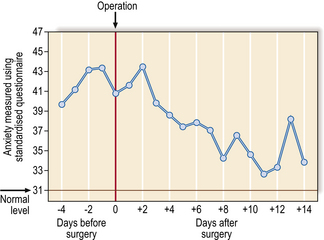Chapter 52 Psychological preparation for surgery
Psychological preparation for surgery is important because it has been shown to reduce patients’ anxiety and to improve recovery in the postoperative period.
Anxiety
Anxiety is an unpleasant emotion associated with threatening situations or thinking about threat. People differ in the degree to which they experience anxiety when facing challenges such as surgery. High anxiety makes it more difficult for the patient to understand information and to cooperate fully with instructions and can interfere with a psychological and physiological recovery processes, including wound healing (see pp. 126–127).
Anxiety in surgical patients
Using standard measures of anxiety which have been developed to deal with the problems of subjective reporting, patients are found to have high levels of anxiety both before and after surgery. For example, Figure 1 shows daily anxiety levels from 4 days before to 14 days after major gynaecological surgery. Compared with normal levels of anxiety as measured 5 weeks after surgery, patients show high levels both before and after surgery. Anxiety before surgery has been found to relate to many postoperative outcomes, including: distress, pain, use of analgesics, and physiological functioning, return to normal activities and length of hospital stay.
Therefore methods of reducing anxiety are likely to improve patient outcomes.




